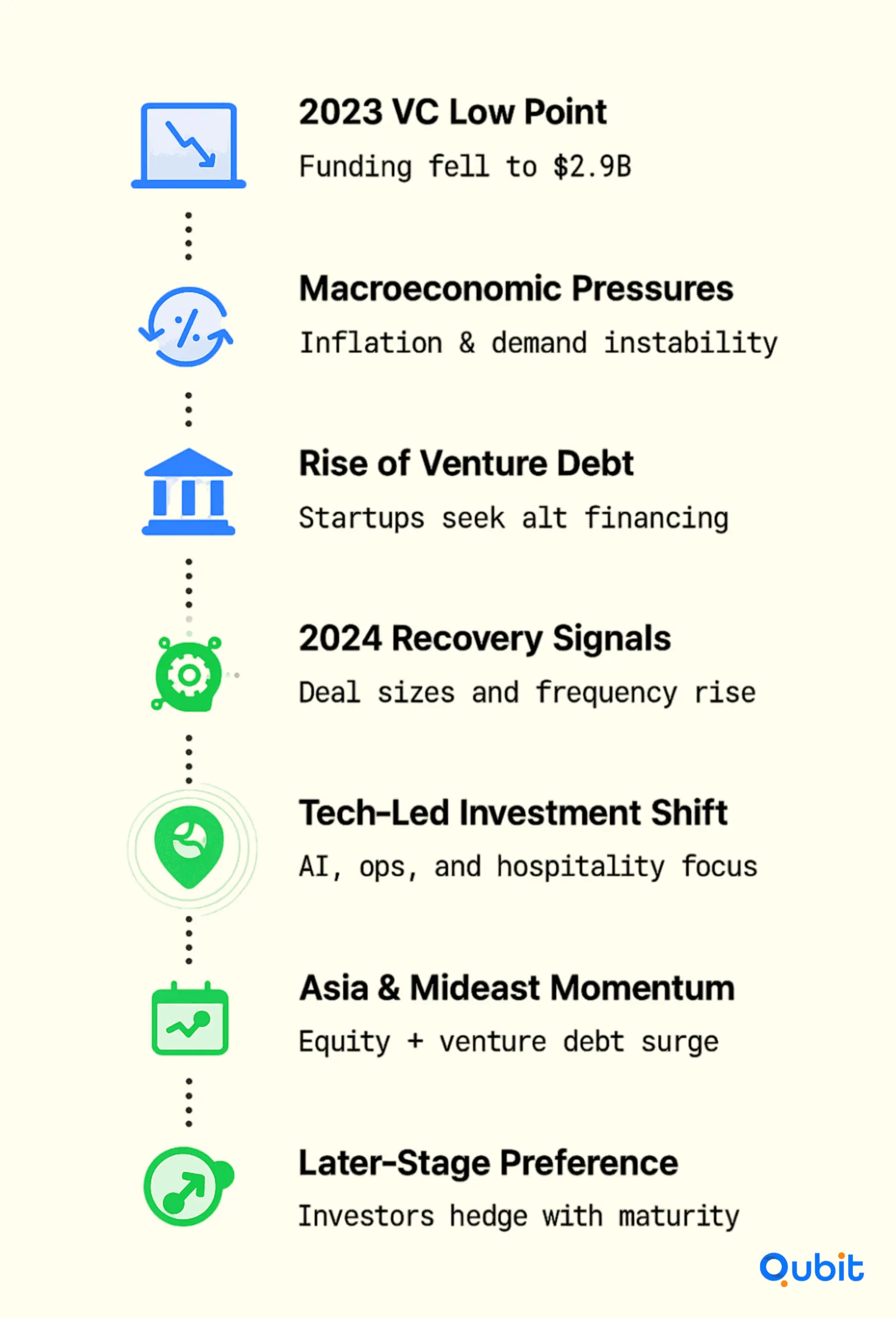Travel start-ups often face unique challenges when scaling their operations, especially when traditional funding avenues fall short. Venture debt for travel startups offers a compelling alternative, providing access to capital without diluting equity. This financing model is particularly appealing for founders seeking to maintain control while fueling growth.
Your study of venture debt gains additional depth when connected to travel startup fundraising strategies, which offers a comprehensive overview of funding frameworks for travel start-ups. By exploring this option, travel entrepreneurs can uncover flexible solutions tailored to their needs.
This blog dives into the nuances of venture debt, analyzing market trends, risk mitigation strategies, and real-world case studies. Let’s jump right in!
What Exactly is Venture Debt?
Venture debt is a form of financing that provides startups with capital, typically in the form of a loan, without requiring large equity dilution. Unlike traditional bank loans, venture debt lenders usually focus on startups that have secured previous equity funding and demonstrated clear growth trajectories. The flexibility of venture debt helps founders bridge gaps between funding rounds, finance significant growth initiatives, or extend their operational runway.
Why Travel Start-ups Benefit from Venture Debt
The travel sector faces unique funding challenges such as high market volatility, seasonal revenue fluctuations, and vulnerability to external disruptions. Venture debt provides tailored solutions for these problems:
- Equity Preservation: Founders retain significant ownership, avoiding the heavy dilution that comes with traditional venture capital rounds.
- Operational Flexibility: Travel startups can utilize funds strategically, particularly valuable when navigating uncertain market conditions.
- Rapid Funding Access: Compared to traditional loans, venture debt is quicker to secure, enabling faster strategic moves, especially during critical growth phases.
Market Analysis & Trends: Key Insights on Venture Debt in Travel Startup Financing

A Decade-Low Funding Landscape in 2023
Travel startups faced a challenging funding environment in 2023, with venture capital investments plummeting to a decade-low of $2.9 billion. This sharp decline highlighted the sector's vulnerability to macroeconomic pressures, including inflation and fluctuating consumer demand. For many travel startups, this downturn underscored the importance of exploring alternative financing models, such as venture debt, to sustain operations and growth during turbulent times.
Signs of Recovery in Early 2024
The early months of 2024 have brought promising signs of recovery, with larger deals and increased funding activity reshaping the travel startup financing landscape. Investors are showing renewed interest in later-stage startups, particularly those leveraging technology to enhance operational efficiency and customer experiences. This rebound suggests a shift in focus toward scalable solutions, such as AI-driven automation and hospitality innovations, which are poised to redefine the travel sector.
Regional Trends: Asia and the Middle East Lead the Way
Geographically, Asia and the Middle East have emerged as key players in travel startup financing. These regions are witnessing a surge in venture debt and equity investments, driven by a growing appetite for tech-enabled travel solutions. This trend reflects a broader shift in investor priorities, with a focus on markets that offer high growth potential and untapped opportunities.
Shifting Investment Focus
Investors are increasingly prioritizing later-stage startups that demonstrate proven scalability and profitability. This shift is particularly evident in sectors like tours and experiences, hospitality solutions, and AI-driven automation. By concentrating on mature startups, investors aim to mitigate risks while capitalizing on the travel sector's evolving demands.
A discussion of travel startup venture capital adds another dimension by contrasting equity-driven financing with the debt models explored here.
Looking Ahead
As the travel sector continues to recover, venture debt is likely to play a pivotal role in enabling startups to scale efficiently while preserving equity. By aligning funding strategies with market trends, travel startups can position themselves for sustainable growth in an increasingly competitive landscape.
Funding Breakdown: Deal Stages and Regional Insights
The report categorizes funding by deal stage, offering granular insights into early-stage investments versus advanced rounds like Series B. Exploration of series b metrics travel startup contributes quantifiable insights that enhance the narrative around scaling travel start-ups with venture debt. Additionally, regional analysis reveals disparities in funding allocation, with North America and Europe leading the charge, while emerging markets in Asia and Latin America show promising growth potential.
Sector-Specific Trends: AI and Property Management Technology
One of the most striking trends is the integration of AI automation across travel startups. From personalized booking experiences to predictive analytics, AI is reshaping how companies operate and interact with customers. Similarly, advances in property management technology are streamlining operations for vacation rental platforms, enabling better inventory management and enhanced customer satisfaction. These innovations not only attract investor interest but also redefine sector-specific strategies for growth.
Strategic Advantages of Venture Debt for Travel Startups
1. Mitigating Seasonal Cash Flow Challenges
Travel businesses experience cyclical revenue streams influenced by travel seasons, economic shifts, and global events. Venture debt helps startups stabilize finances during lean periods without significant equity loss.
2. Bridging Between Funding Rounds
Startups often face periods where additional capital is needed between equity funding rounds. Venture debt bridges this gap seamlessly, ensuring ongoing growth initiatives aren’t interrupted.
3. Accelerating Growth and Innovation
Whether expanding market reach, investing in innovative technology like AI-driven platforms, or scaling marketing campaigns, venture debt offers targeted funding without sacrificing founder control.
Practical Steps to Secure Venture Debt for Travel Startups
Successfully accessing venture debt involves clear strategy and preparation:
Step 1: Demonstrate Proven Revenue and Growth Potential
Venture debt lenders prioritize startups that exhibit solid revenue generation or proven market traction. Ensure your financial statements clearly show growth, revenue consistency, and customer retention metrics.
Step 2: Prepare Detailed Financial Projections
Craft accurate, data-driven projections showcasing how venture debt funds will directly support your growth strategies. Highlight clear repayment capabilities within your financial forecasts.
Step 3: Select the Right Venture Debt Partner
Choose lenders familiar with the travel sector’s unique challenges. These providers are more likely to offer flexible terms tailored specifically to your startup’s industry and growth stage.
Real-World Examples: Travel Startups Leveraging Venture Debt Successfully
Sonder
Sonder, a hospitality startup combining hotels and apartments with a tech-driven approach, leveraged venture debt strategically to expand its footprint quickly without significantly diluting founder equity, fueling its operational growth.
GetYourGuide
Travel experiences platform GetYourGuide used venture debt effectively to bridge funding rounds, maintain operational continuity, and strategically invest in market expansion without giving up substantial ownership stakes prematurely.
Conclusion
Venture debt for travel startups offers a promising path to secure funding while preserving equity. By combining debt funding strategies with flexible repayment terms, startups can access capital without significant ownership dilution. This approach is particularly advantageous for travel businesses aiming to scale operations or invest in technology while maintaining control over their vision.
The benefits of venture debt extend beyond financial flexibility—it empowers founders to focus on growth without compromising their stake in the company. However, understanding the nuances of debt financing is crucial to making informed decisions. Seeking expert advice ensures startups can align their funding strategies with long-term goals.
If you're ready to explore flexible funding options, we at Qubit Capital can guide you with our Fundraising Assistance service. Contact us to learn more and take the next step toward sustainable growth.
Frequently asked Questions
Is venture debt suitable for early-stage travel startups?
Venture debt typically favors startups that have secured initial equity funding and can demonstrate growth potential or predictable revenue streams.


 Back
Back



